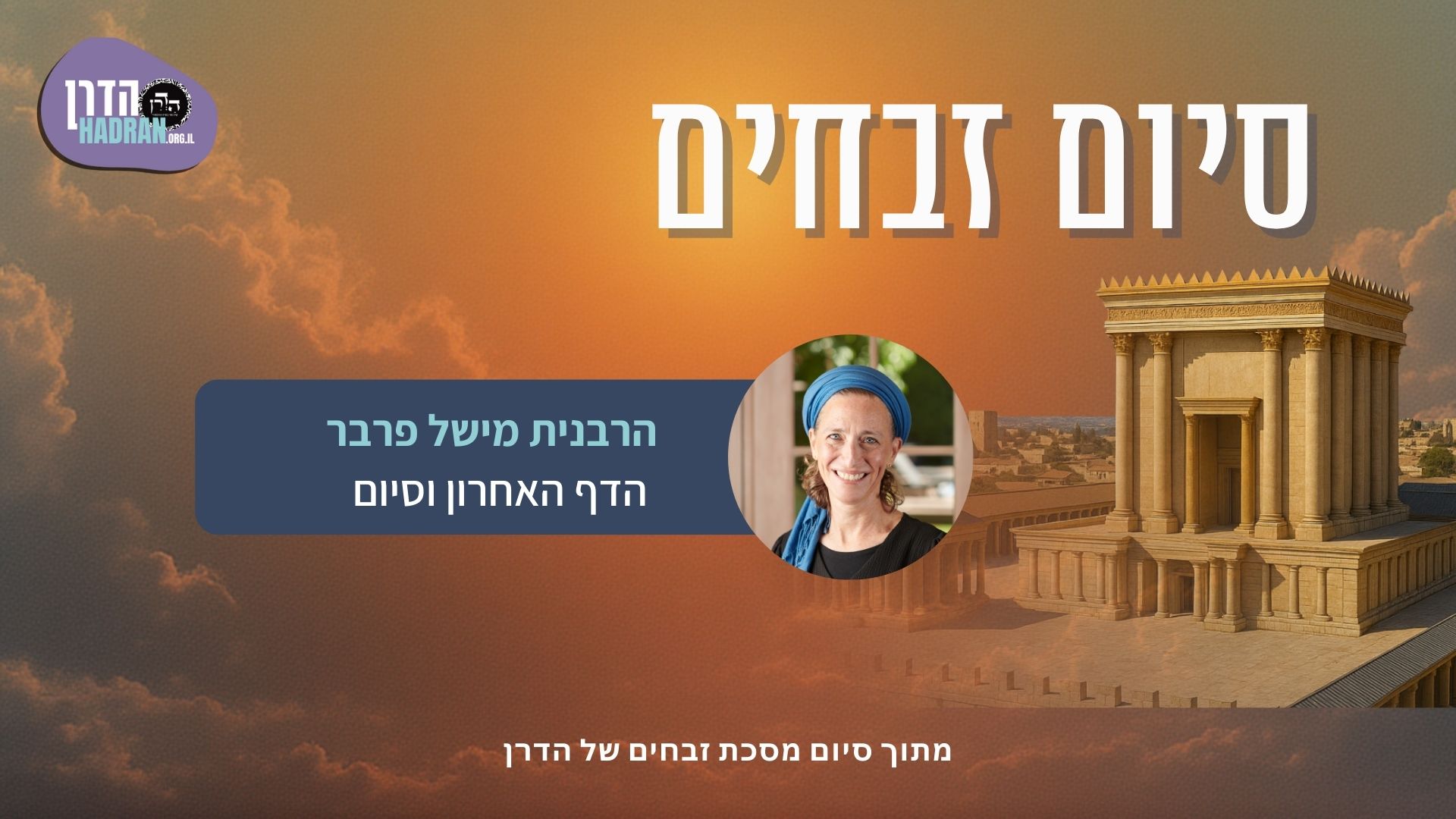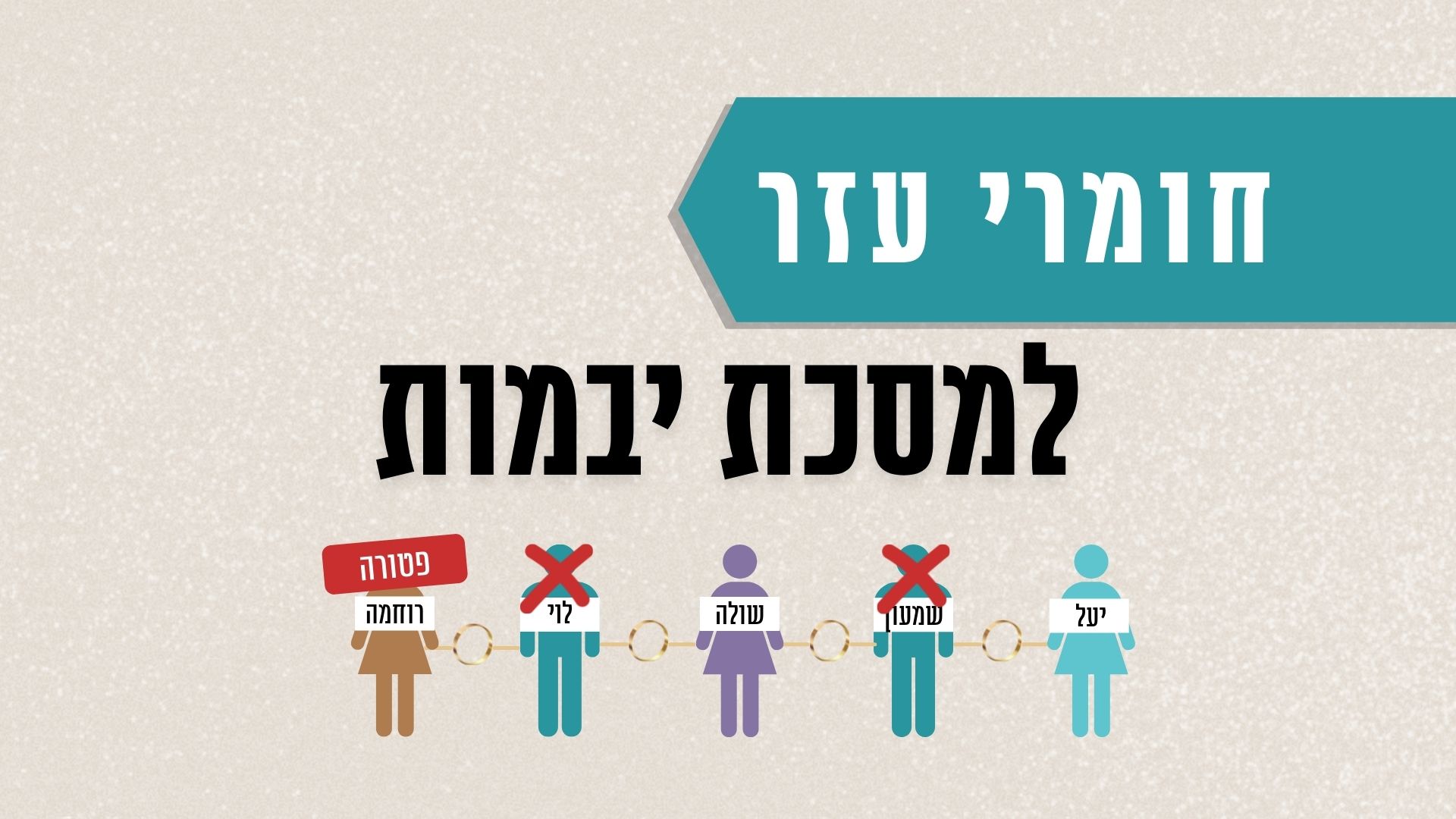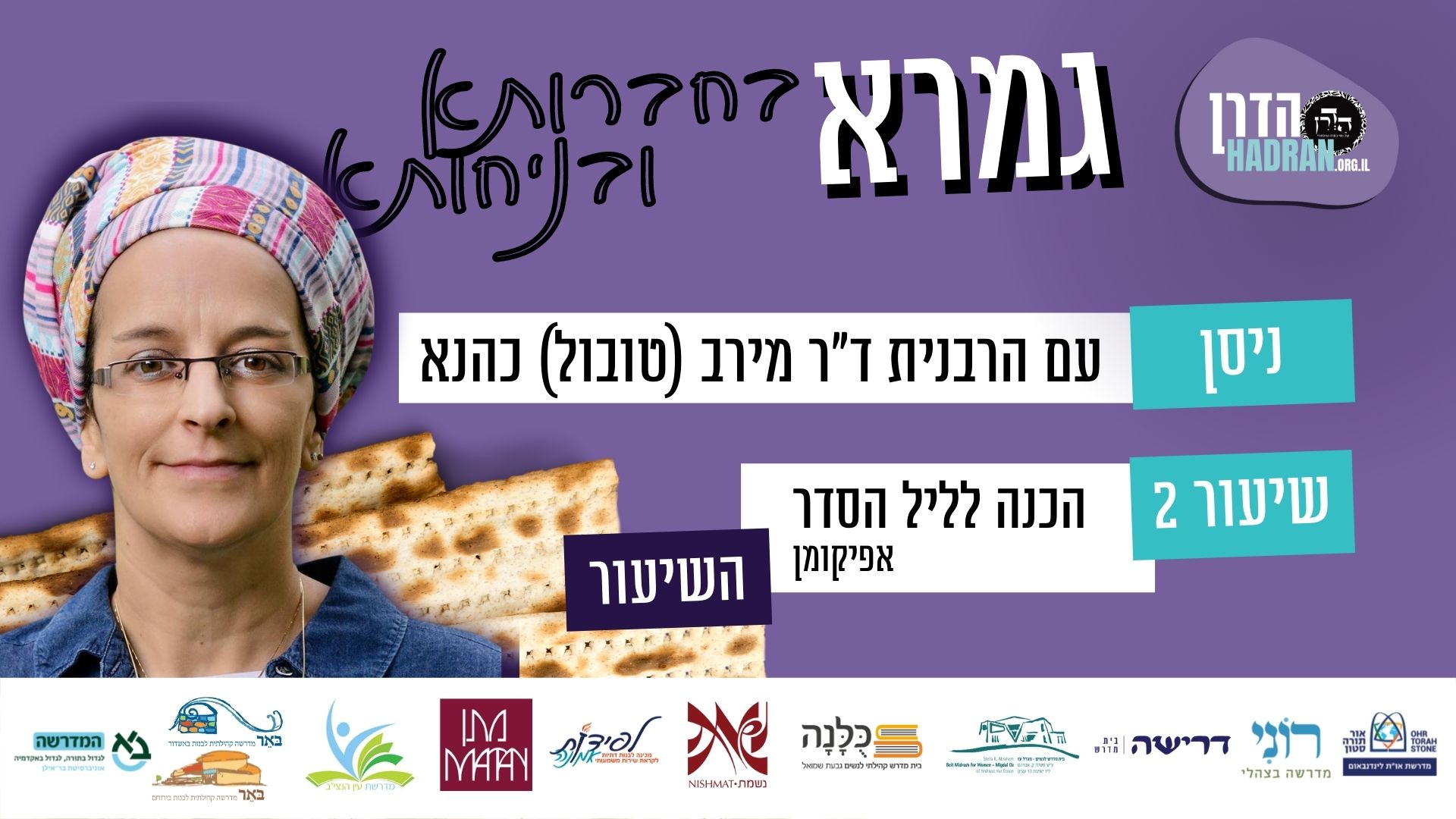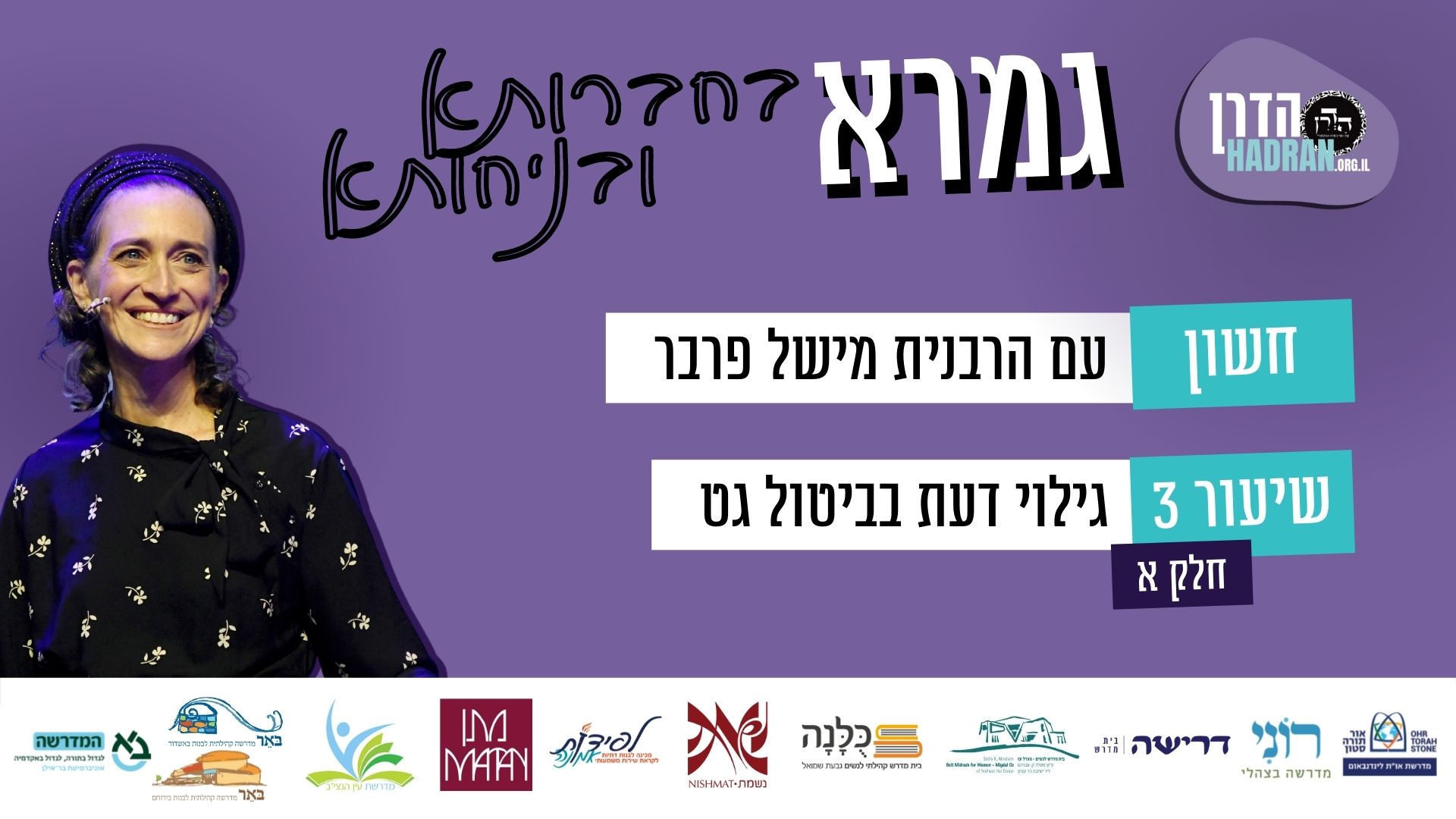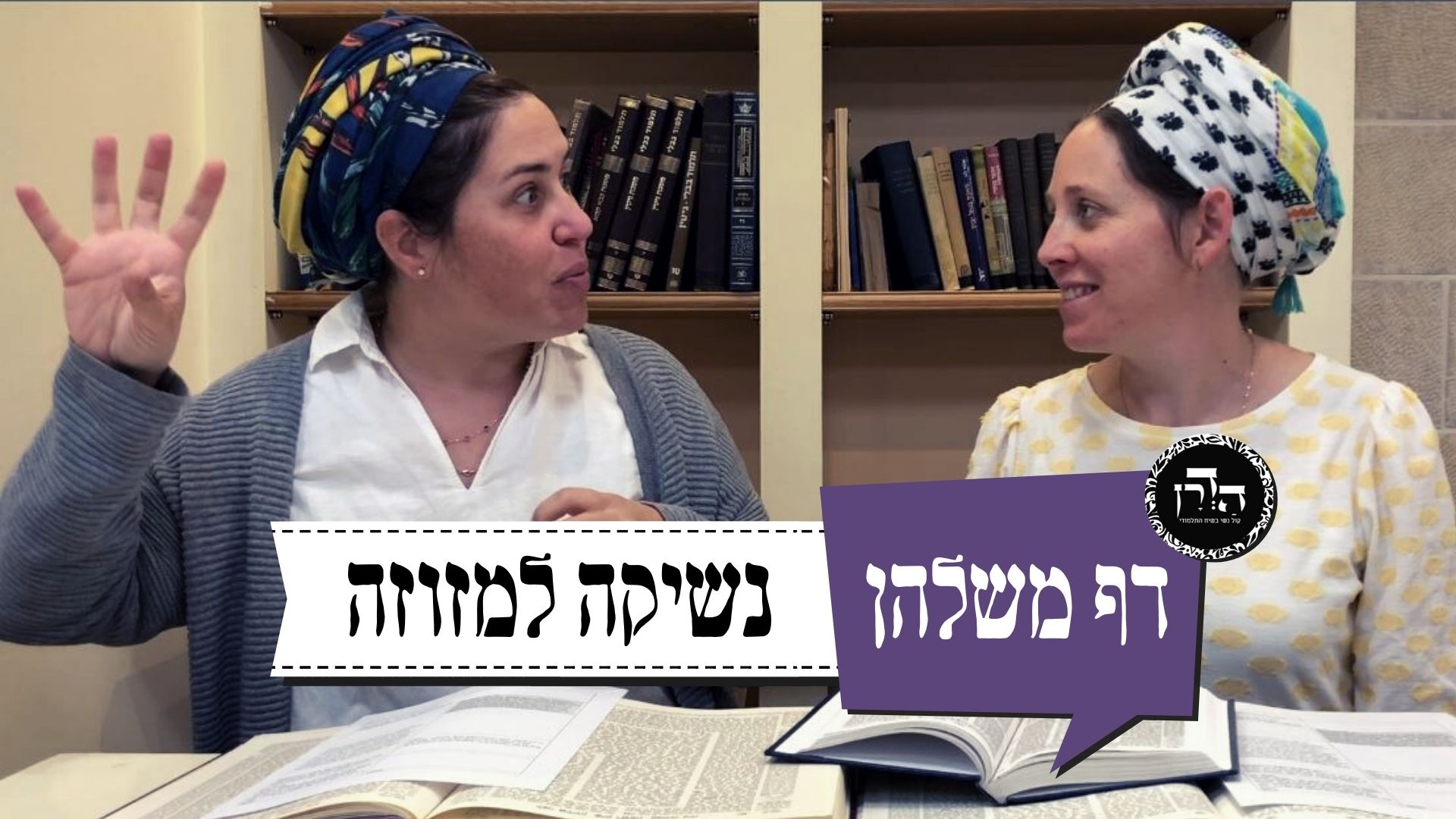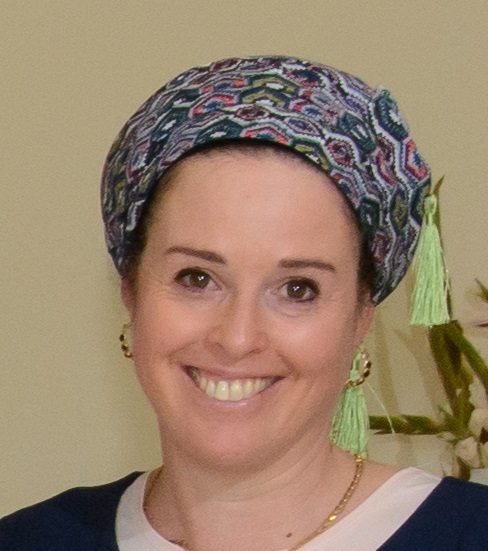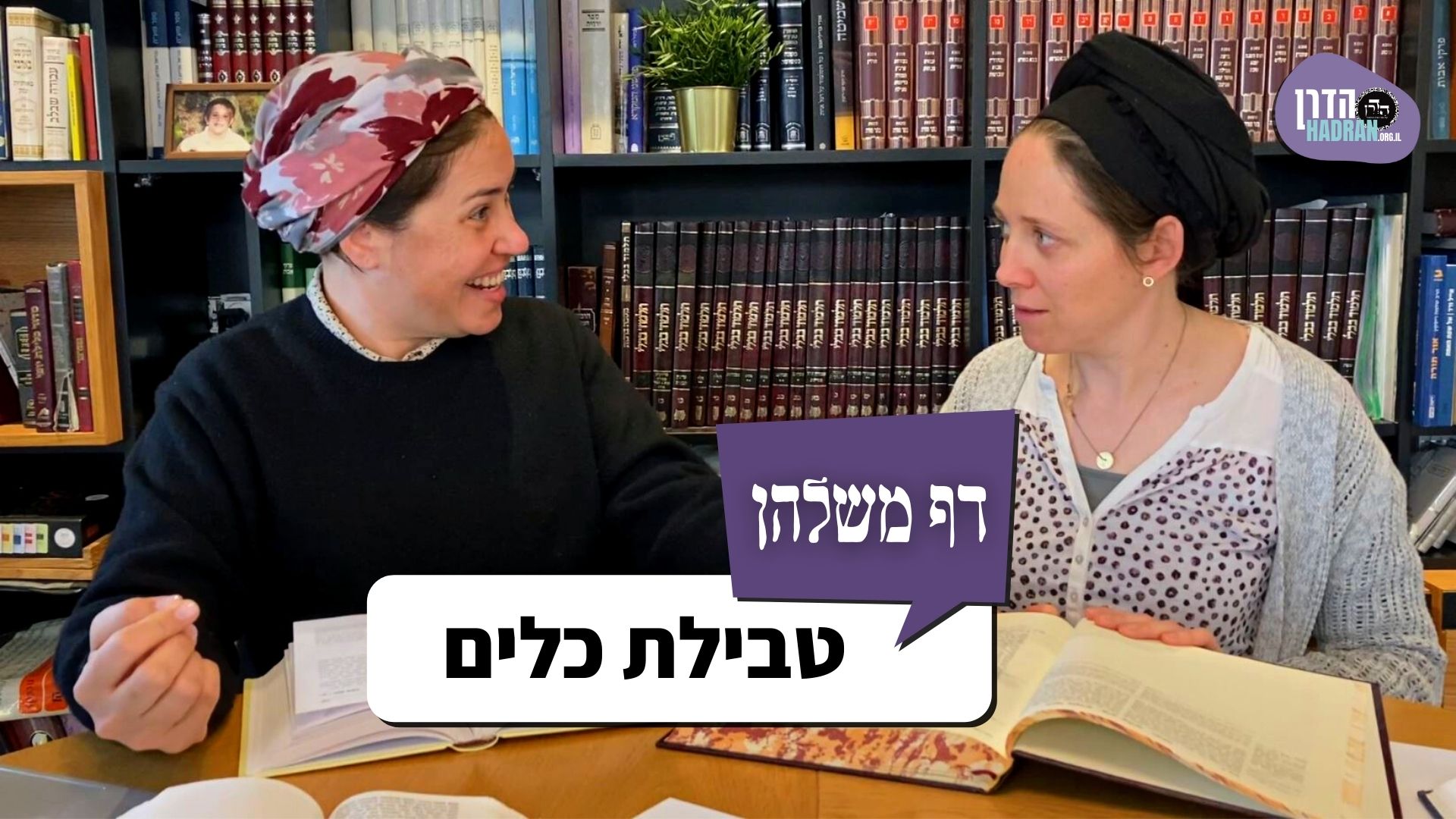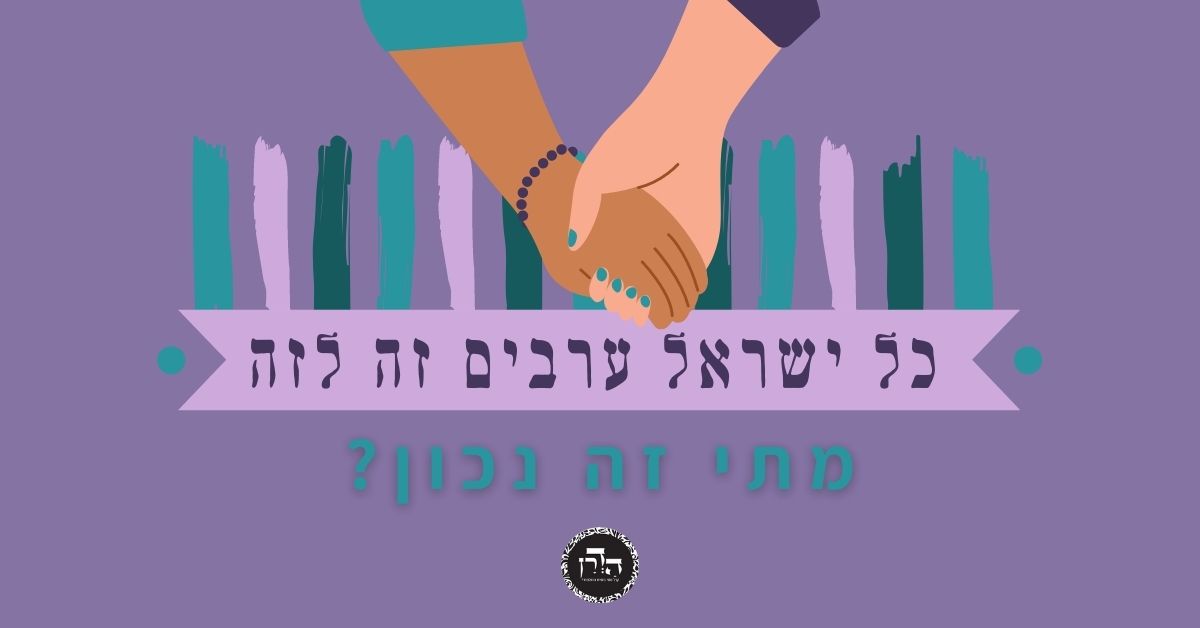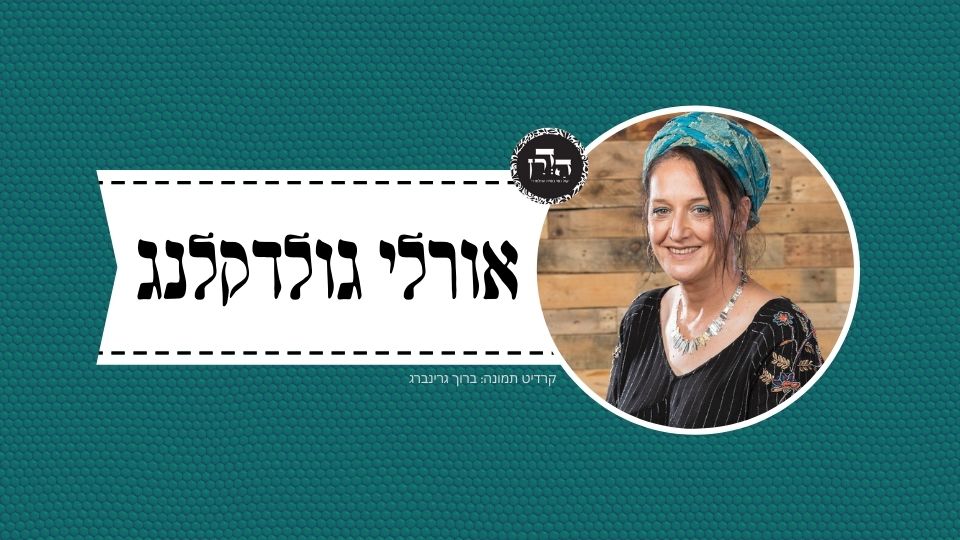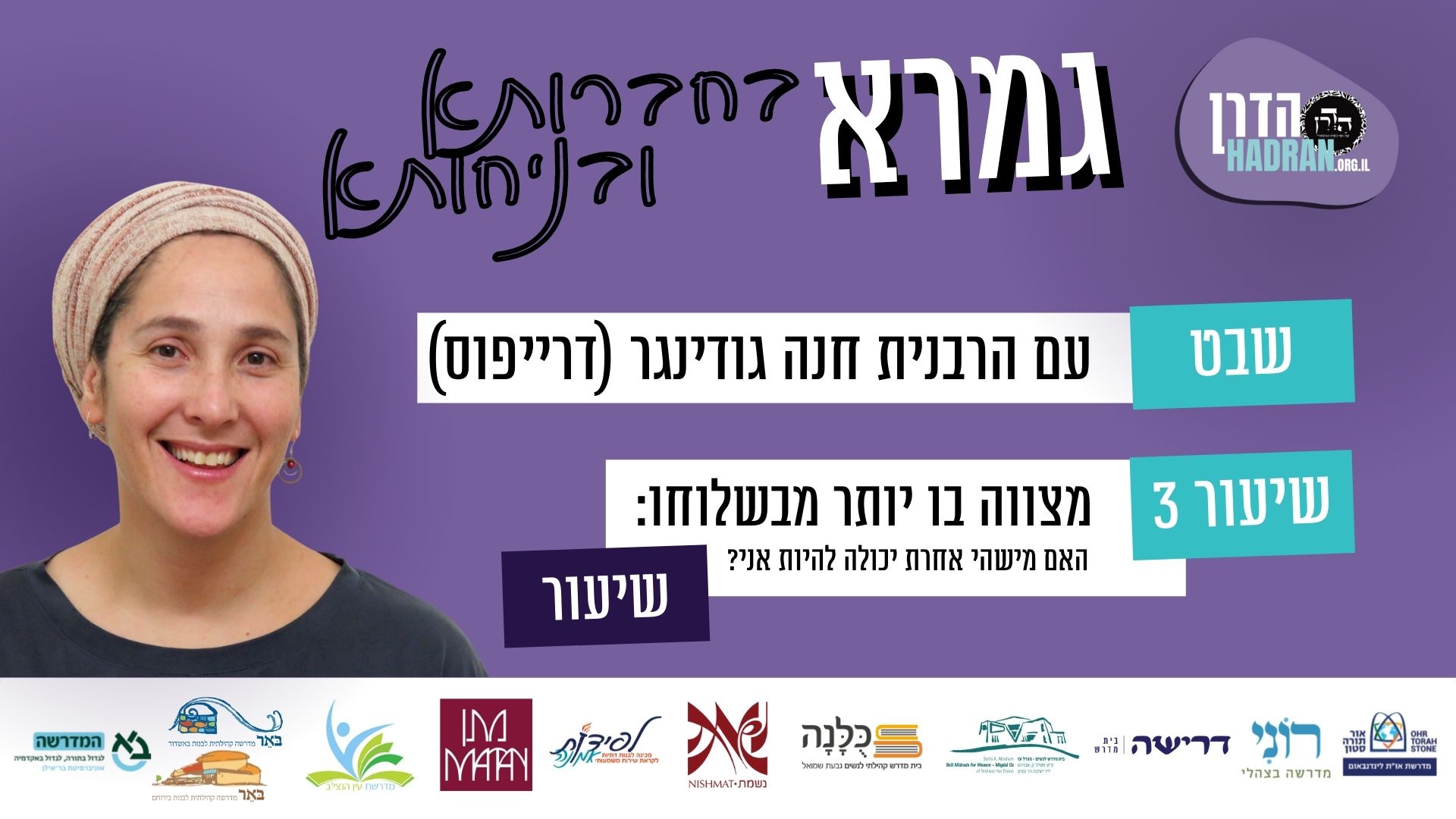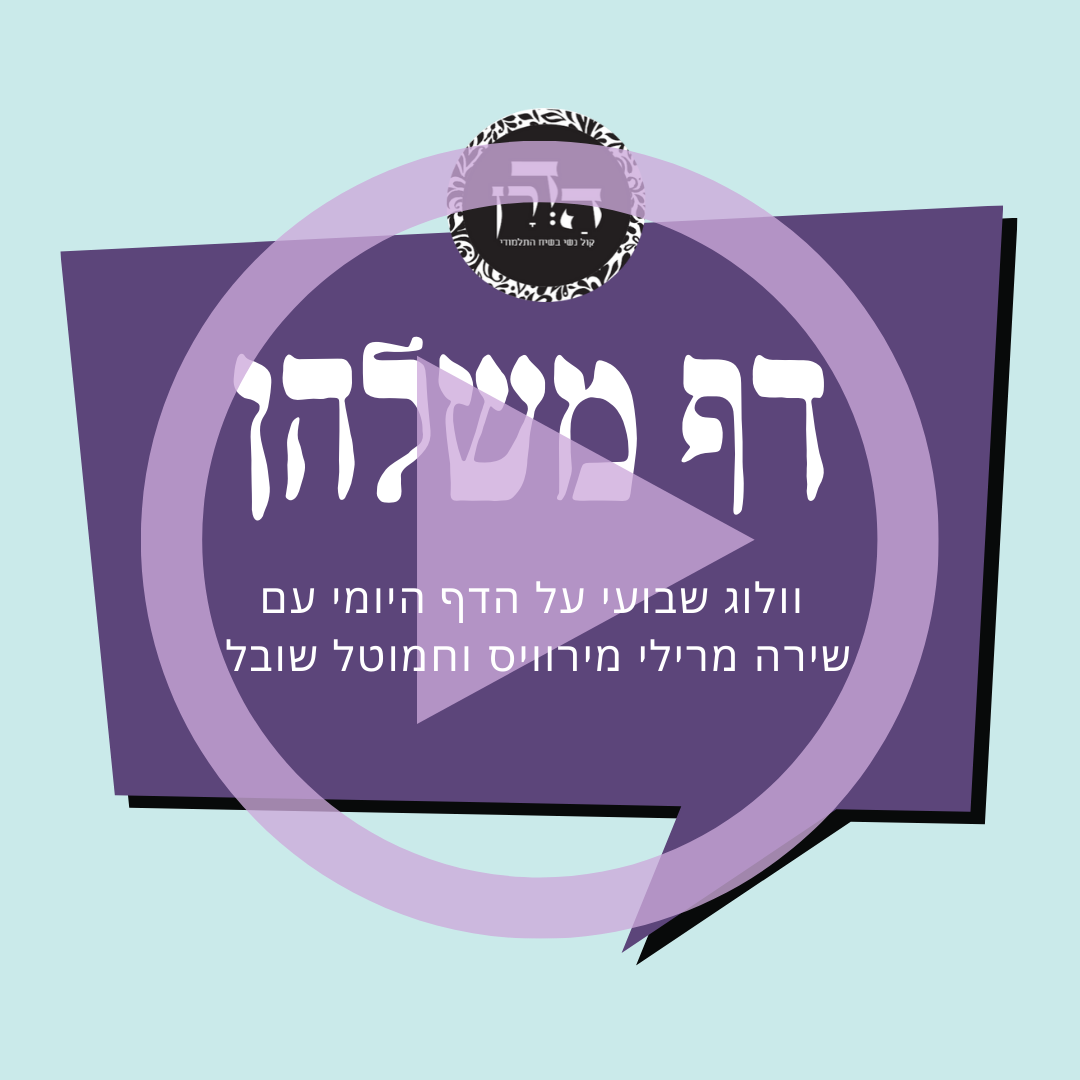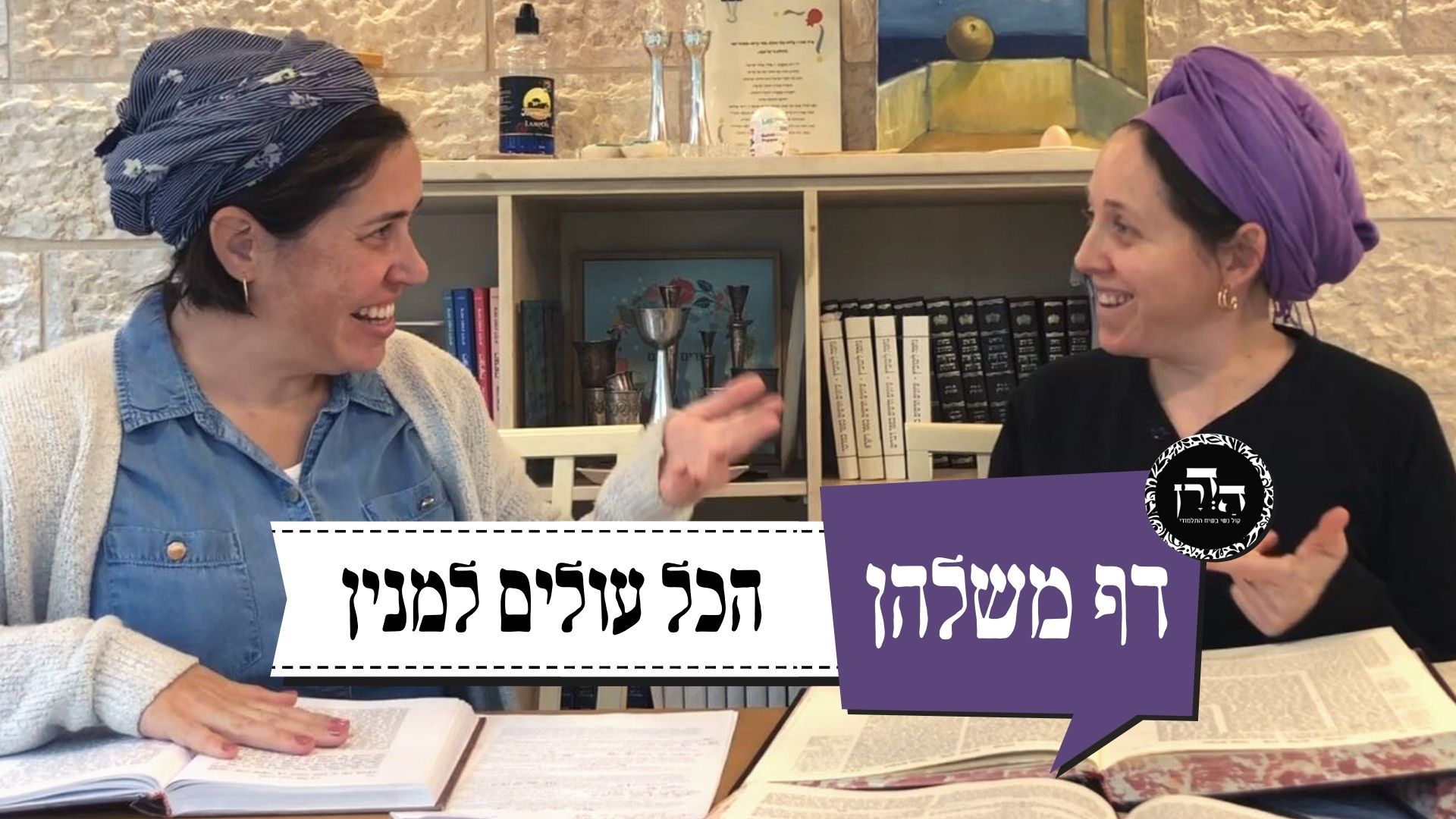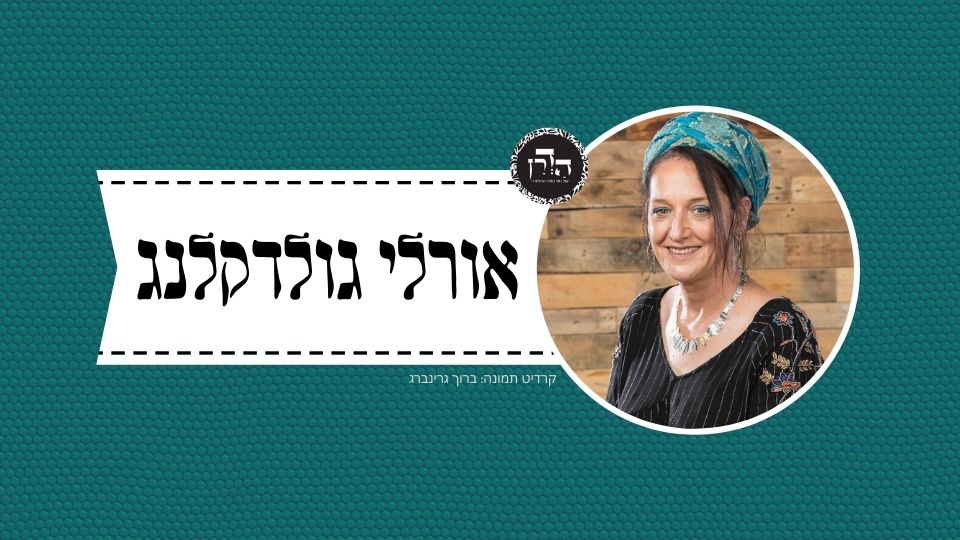דיונים במקרים שונים של שני איסורים – האם איסור חל על איסור במקרים אלו כגון גיד הנשה בבהמה לא כשרה, גיד הנשה בנבלה.
הלימוד השבוע מוקדש לזכות ולשלום הַיְימׇנוֹט אֱמוּנָה בַּת באנצ’י (קָסָאוּ) בת 11 שנעלמה במקום מגוריה בצפת, לפני שנתיים, ביום ט”ז אדר תשפ”ד (25.2.24), ולא נודעו עקבותיה.
הלימוד השבוע מוקדש למען ביטחון המדינה, החיילים והאזרחים, ולמען חירותו של העם האיראני. שנזכה בקרוב שיתקיים בנו הפסוק: "לַיְּהוּדִים הָיְתָה אוֹרָה וְשִׂמְחָה וְשָׂשֹׂן וִיקָר”.
הלימוד השבוע מוקדש לזכות וְלִשְׁלוֹם הָיימָנוֹט אֱמוּנָה בַּת באנצ’י (קָסָאוּ), בת 11 שנעלמה במקום מגוריה בצפת, לפני שנתיים, ביום ט”ז אדר תשפ״ד (25.2.24), ולא נודעו עקבותיה. אנו מתפללים שֶׁתִּמָּצֵא וְתוּשַׁב לביתה במהרה!
רוצה להקדיש שיעור?

כלים
הלימוד השבוע מוקדש לזכות ולשלום הַיְימׇנוֹט אֱמוּנָה בַּת באנצ’י (קָסָאוּ) בת 11 שנעלמה במקום מגוריה בצפת, לפני שנתיים, ביום ט”ז אדר תשפ”ד (25.2.24), ולא נודעו עקבותיה.
הלימוד השבוע מוקדש למען ביטחון המדינה, החיילים והאזרחים, ולמען חירותו של העם האיראני. שנזכה בקרוב שיתקיים בנו הפסוק: "לַיְּהוּדִים הָיְתָה אוֹרָה וְשִׂמְחָה וְשָׂשֹׂן וִיקָר”.
הלימוד השבוע מוקדש לזכות וְלִשְׁלוֹם הָיימָנוֹט אֱמוּנָה בַּת באנצ’י (קָסָאוּ), בת 11 שנעלמה במקום מגוריה בצפת, לפני שנתיים, ביום ט”ז אדר תשפ״ד (25.2.24), ולא נודעו עקבותיה. אנו מתפללים שֶׁתִּמָּצֵא וְתוּשַׁב לביתה במהרה!
כלים
העמקה
רוצה להבין מה באמת קורה מתחת לפני השטח של הסוגיה?
שיעורים, פודקאסטים והרחבות של מיטב המורות שלנו יפתחו לך עוד זוויות וכיווני חשיבה.
חדשה בלימוד הגמרא?
זה הדף הראשון שלך? איזו התרגשות עצומה! יש לנו בדיוק את התכנים והכלים שיעזרו לך לעשות את הצעדים הראשונים ללמידה בקצב וברמה שלך, כך תוכלי להרגיש בנוח גם בתוך הסוגיות המורכבות ומאתגרות.
פסיפס הלומדות שלנו
גלי את קהילת הלומדות שלנו, מגוון נשים, רקעים וסיפורים. כולן חלק מתנועה ומסע מרגש ועוצמתי.
חולין קא
ורבי שמעון פוטר
and Rabbi Shimon exempts him entirely.
ור”ש מה נפשך אי איסור חל על איסור ליחייב נמי משום גיד אי אין איסור חל על איסור ליחייב משום טומאה דקדים ואי אין בגידין בנותן טעם ליחייב משום גיד
The Gemara objects: But according to Rabbi Shimon, whichever way you look at it, it is difficult. If a prohibition takes effect where another prohibition already exists, let Rabbi Shimon deem one liable for eating non-kosher meat and also due to the prohibition of eating the sciatic nerve. Conversely, if a prohibition does not take effect where another prohibition already exists, let Rabbi Shimon deem one liable due to the prohibition of eating meat from a non-kosher species, which preceded the prohibition of the sciatic nerve. And if Rabbi Shimon holds that sciatic nerves do not impart flavor, and therefore the prohibition of eating non-kosher meat does not apply, let him deem one liable due to the prohibition of eating the sciatic nerve.
אמר רבא לעולם קסבר אין בגידים בנותן טעם ושאני התם דאמר קרא (בראשית לב, לג) על כן לא יאכלו בני ישראל את גיד הנשה מי שגידו אסור ובשרו מותר יצתה זו שגידו אסור ובשרו אסור
Rava said in response: Actually Rabbi Shimon holds that sciatic nerves do not impart flavor, and therefore they are not subject to the prohibition of eating non-kosher meat. And the reason the prohibition of eating the sciatic nerves does not apply to non-kosher animals is that it is different there, because the verse states: “Therefore the children of Israel eat not the sciatic nerve” (Genesis 32:33). This teaches that the prohibition applies only to a species whose sciatic nerve is forbidden but whose meat is permitted, and excludes this case of a non-kosher animal, whose sciatic nerve would be forbidden and whose meat would also be forbidden.
אמר רב יהודה אמר רב האוכל גיד הנשה של נבלה ר”מ מחייב שתים וחכמים אומרים אינו חייב אלא אחת
§ Having discussed the status of the sciatic nerve of a non-kosher animal, the Gemara addresses the status of the sciatic nerve of a kosher animal that did not undergo a proper ritual slaughter. Rav Yehuda says that Rav says: With regard to one who eats the sciatic nerve of an unslaughtered carcass, Rabbi Meir deems him liable to receive two sets of lashes, and the Rabbis say: He is liable to receive only one set of lashes.
ומודים חכמים לר”מ באוכל גיד הנשה של עולה ושל שור הנסקל שחייב שתים
And the Rabbis concede to Rabbi Meir in a case where one eats the sciatic nerve of a burnt offering or of an ox that is stoned that he is liable to receive two sets of lashes. The prohibitions concerning a burnt offering and an ox that is stoned are more severe than that of the sciatic nerve, in that it is forbidden to derive any benefit from them, whereas the sciatic nerve is merely forbidden for consumption. Consequently, these prohibitions take effect even with regard to the sciatic nerve, despite the fact that the sciatic nerve was already forbidden before the animal was consecrated or before it gored a person and became liable to be stoned.
ומאן האי תנא דבאיסור כולל איסור חל על איסור לית ליה איסור כולל באיסור חמור אית ליה
The Gemara challenges: And who is this tanna who does not hold that in the case of a more inclusive prohibition, the prohibition takes effect where another prohibition already exists, and consequently, according to his opinion the prohibition of eating an unslaughtered animal, which applies to the entire animal, does not take effect with regard to the sciatic nerve. Yet, he does hold that where the second prohibition is both a more inclusive prohibition and a more stringent prohibition, it does take effect, and therefore the prohibition of eating a burnt offering or an ox that is stoned does take effect with regard to the sciatic nerve.
אמר רבא רבי יוסי הגלילי היא דתנן טמא שאכל קדש בין קדש טמא בין קדש טהור חייב
Rava said: It is Rabbi Yosei HaGelili who holds that a more inclusive prohibition does not take effect where there is an already existing prohibition. As we learned in a mishna (Zevaḥim 106a): One who is ritually impure who ate sacrificial food, whether it was ritually impure sacrificial food or ritually pure sacrificial food, is liable to receive karet if he did so intentionally and to bring a sliding-scale offering if he did so unwittingly.
רבי יוסי הגלילי אומר טמא שאכל את הטהור חייב טמא שאכל את הטמא פטור שלא אכל אלא דבר טמא
Rabbi Yosei HaGelili says: An impure individual who ate pure sacrificial food is liable. But an impure individual who ate impure sacrificial food is exempt, as he merely ate an impure item, and the prohibition of eating sacrificial food while one is impure does not apply to impure sacrificial food.
אמרו לו אף טמא שאכל את הטהור כיון שנגע בו טמאהו
The Rabbis said to him: According to your logic, this halakha would apply even in a case of an impure individual who ate what had been pure sacrificial food, because once he has touched it, he has thereby rendered it impure. Yet, in such a case, he is certainly liable for eating it. So too, an impure individual who ate impure sacrificial food is liable.
שפיר קא אמרי ליה רבנן לר’ יוסי הגלילי ואמר רבא בנטמא הגוף ואח”כ נטמא בשר כולי עלמא לא פליגי דחייב דאיסור כרת קדים
The Gemara asks: The Rabbis are saying well to Rabbi Yosei HaGelili; why does Rabbi Yosei HaGelili disagree? And Rava said in elaboration of the dispute: In a case where the person’s body became impure and then afterward the sacrificial meat became impure, everyone agrees that he is liable if he eats the meat, as the prohibition of eating sacrificial meat while impure, which carries the punishment of karet, preceded the prohibition of eating impure sacrificial meat.
כי פליגי בנטמא בשר ואח”כ נטמא הגוף רבנן אית להו איסור כולל דמגו דמיחייב אחתיכות טהורות דעלמא מיחייב נמי אחתיכה טמאה
They disagree when the meat became impure and then afterward the person’s body became impure. The Rabbis hold that a more inclusive prohibition takes effect even where there is an already existing prohibition. Consequently, since the prohibition for an impure person to eat sacrificial meat is more inclusive than the prohibition for a pure person to eat impure sacrificial meat, as an impure person is liable for eating even pure pieces of sacrificial meat that are permitted to the rest of the world, he is also liable for this prohibition when he eats an impure piece of sacrificial meat.
ורבי יוסי הגלילי לית ליה איסור כולל דמגו לא אמרינן
And Rabbi Yosei HaGelili does not accept the principle that a more inclusive prohibition takes effect even where there is an already existing prohibition, as he holds that we do not say that since it applies to cases that were not yet prohibited it applies to all cases.
ורבי יוסי הגלילי נהי דאיסור כולל לית ליה באיסור קל יבא איסור חמור יחול על איסור קל ומאי ניהו טומאת הגוף שהרי טומאת הגוף בכרת
The Gemara objects: But even according to Rabbi Yosei HaGelili, granted that he does not hold that a more inclusive prohibition always takes effect where there is an already existing prohibition. But in the case of an already existing lenient prohibition, a more stringent prohibition should come and take effect on the more lenient prohibition. And what is the more stringent prohibition? The prohibition due to the impurity of a person’s body, as one who eats sacrificial food when he has impurity of the body is liable to karet, whereas a pure person who eats impure sacrificial food is merely liable to be flogged. Consequently, the prohibition of eating sacrificial food while impure should apply even though the meat became impure before the person became impure.
אמר רב אשי מאן לימא לן דטומאת הגוף חמורה דלמא טומאת בשר חמורה דלית ליה טהרה במקוה
Rav Ashi said: Who can say to us that the prohibition due to the impurity of a person’s body is more stringent? Perhaps the prohibition due to the impurity of the meat is more stringent, as impure meat does not have the possibility of restoring its state of purity via immersion in a ritual bath, whereas a ritually impure person can become pure in this manner.
ורבי יוסי הגלילי לית ליה איסור כולל
The Gemara asks: And does Rabbi Yosei HaGelili not hold that a more inclusive prohibition takes effect where there is an already existing prohibition?
והתניא שבת ויוה”כ שגג ועשה מלאכה מנין שחייב על זה בעצמו ועל זה בעצמו תלמוד לומר (ויקרא כג, ג) שבת היא (ויקרא כג, כז) יום הכפורים הוא דברי רבי יוסי הגלילי רבי עקיבא אומר אינו חייב אלא אחת
But isn’t it taught in a baraita: When Shabbat and Yom Kippur occur on the same day, if one acted unwittingly and performed prohibited labor, from where is it derived that he is liable for this by itself and for that by itself, i.e., he is liable to bring two sin offerings, for having transgressed both Shabbat and Yom Kippur? The verse states: “You shall do no manner of work; it is a Shabbat for the Lord in all your dwellings” (Leviticus 23:3), and another verse states: “It is Yom Kippur” (Leviticus 23:27). The term “it is” in each verse teaches that each of these days is considered independently even when it occurs together with another holy day. This is the statement of Rabbi Yosei HaGelili. Rabbi Akiva says: He is liable to bring only one sin offering because a prohibition does not take effect where another prohibition already exists.
שלח רבין משום דרבי יוסי בר’ חנינא כך הצעה של משנה ואיפוך
The Gemara answers that on this topic Ravin sent a letter citing a statement in the name of Rabbi Yosei, son of Rabbi Ḥanina: This is the correct presentation of this teaching [hatza’a shel mishna], i.e., the opinions in this baraita are accurate, but one must reverse the attributions of each opinion so that the first opinion is that of Rabbi Akiva and the second opinion is that of Rabbi Yosei HaGelili. Consequently, Rabbi Yosei HaGelili holds that two prohibitions do not take effect at the same time even if one is more inclusive or stringent than the other.
שלח רב יצחק בר יעקב בר גיורי משום דרבי יוחנן לדברי רבי יוסי הגלילי למאי דאפכן שגג בשבת והזיד ביום הכפורים חייב הזיד בשבת ושגג ביום הכפורים פטור
The Gemara continues to discuss the opinion of Rabbi Yosei HaGelili. Rav Yitzḥak bar Ya’akov bar Giyorei sent a letter citing a statement in the name of Rabbi Yoḥanan: According to the statement of Rabbi Yosei HaGelili, as stated in the baraita once the attributions have been reversed, if one unwittingly performed a forbidden labor on a Yom Kippur that occurred on Shabbat, he is obligated to bring one sin offering. If he acted unwittingly with regard to the fact that it was Shabbat, i.e., he forgot that it was Shabbat, but acted intentionally with regard to Yom Kippur, he is obligated to bring a sin offering. But if he acted intentionally with regard to Shabbat but unwittingly with regard to Yom Kippur, he is exempt from bringing any offering.
מאי טעמא אמר אביי שבת קביעא וקיימא יום הכפורים בי דינא דקא קבעי ליה
The Gemara asks: What is the reason for Rabbi Yoḥanan’s statement? Abaye said: Shabbat is established and permanent, i.e., it always occurs on the seventh day of the week, whereas in the case of Yom Kippur, it is the court that establishes it, as the Sages determine the New Moon. Consequently, Shabbat is considered to have preceded Yom Kippur, and the prohibition to perform labor on Yom Kippur does not apply, due to the fact that labor is already prohibited because it is Shabbat. Since one brings a sin offering only due to unwitting transgression, he is obligated to bring a sin offering only if he performed labor without realizing it was Shabbat.
אמר ליה רבא סוף סוף תרוייהו בהדי הדדי קאתו אלא אמר רבא שמדא הוה ושלחו מתם דיומא דכפורי דהא שתא שבתא הוא וכן כי אתא רבין וכל נחותי אמרוה כרבא:
Rava said to Abaye: Ultimately both of them, i.e., Shabbat and Yom Kippur, come into effect at the same time. Since both take effect at the beginning of the calendar day, it cannot be said that Shabbat precedes Yom Kippur. Rather Rava said a different explanation. It was a time of religious persecution, and they sent from there, i.e., from Eretz Yisrael, a directive stating that Yom Kippur of this year will not be observed on its proper day but rather on Shabbat. Rabbi Yoḥanan was merely stating that on that particular year one who would unwittingly transgress Yom Kippur would be exempt from bringing a sin offering. And similarly, when Ravin and all those who descended from Eretz Yisrael came to Babylonia, they said that the true explanation is in accordance with the opinion of Rava.
אמר רבי יהודה והלא מבני יעקב [וכו’]:
§ The mishna teaches: Rabbi Yehuda said in explanation: Wasn’t the sciatic nerve forbidden for the children of Jacob, as it is written: “Therefore the children of Israel eat not the sciatic nerve” (Genesis 32:33), yet the meat of a non-kosher animal was still permitted to them? Since the sciatic nerve of non-kosher animals became forbidden at that time, it remains forbidden now.
תניא אמרו לו לר’ יהודה וכי נאמר על כן לא יאכלו בני יעקב והלא לא נאמר אלא בני ישראל ולא נקראו בני ישראל עד סיני אלא בסיני נאמר אלא שנכתב במקומו לידע מאיזה טעם נאסר להם
It is taught in a baraita that the Rabbis said to Rabbi Yehuda: But is it stated in the verse: Therefore the children of Jacob do not eat the sciatic nerve? Isn’t it true that it is stated only that: “Therefore the children of Israel do not eat the sciatic nerve?” And the Jewish people were not called “the children of Israel” until they received the Torah at Mount Sinai. Rather, this terminology indicates that the prohibition of eating the sciatic nerve was stated to the Jewish people at Sinai, but was written in its place, after the incident of Jacob wrestling with the angel, to allow the Jewish people to know the reason the sciatic nerve was forbidden to them. Since the prohibition came into effect only at Sinai, there is no proof that it ever applied with regard to non-kosher animals.
מתיב רבא (בראשית מו, ה) וישאו בני ישראל את יעקב אביהם לאחר מעשה
Rava raises an objection to this baraita: The verse states: “And Jacob rose up from Beersheba; and the children of Israel carried Jacob their father, and their little ones, and their wives in the wagons that Pharaoh had sent to carry him” (Genesis 46:5). This occurred before the Torah was given at Sinai, and therefore proves that the title “the children of Israel” was in use before the Torah was given. The Gemara answers: Nevertheless, this occurred after the incident, i.e., after Jacob wrestled with the angel and after the prophetic vision in which God changed Jacob’s name to Israel (Genesis 35:10).
אמר ליה רב אחא בריה דרבא לרב אשי מההיא שעתא ליתסר
Rav Aḥa, son of Rava, said to Rav Ashi: In that case, the sciatic nerve should be understood as having become forbidden to them from that time when they were first called the children of Israel. Since this was before the giving of the Torah, this would be in accordance with the opinion of Rabbi Yehuda and not that of the Rabbis.
אמר ליה וכי תורה פעמים פעמים ניתנה ההוא שעתא לאו שעת מעשה הואי ולא שעת מתן תורה הואי
Rav Ashi said to him: Was the Torah given piecemeal, on numerous different occasions? It was given at Sinai. Rather, that time when the title “children of Israel” was first used was not the time when the incident of Jacob wrestling with the angel occurred and also was not the time of the giving of the Torah at Mount Sinai. Therefore, there is no reason to assume that the prohibition took effect at that time.
ת”ר אבר מן החי נוהג בבהמה חיה ועוף בין טמאין ובין טהורין דברי רבי יהודה ורבי אלעזר וחכמים אומרים אינו נוהג אלא בטהורין
§ The mishna taught a dispute between Rabbi Yehuda and the Rabbis with regard to the prohibition of eating the sciatic nerve. The Gemara now cites a similar dispute between them with regard to eating a limb from a living animal. The Sages taught in a baraita: The prohibition of eating a limb from a living animal applies whether the limb comes from a domesticated animal, an undomesticated animal, or a bird, and whether it is from a non-kosher species or from a kosher species; this is the statement of Rabbi Yehuda and Rabbi Elazar. But the Rabbis say: The prohibition of eating a limb from a living animal applies only to a limb from a kosher species.
אמר ר’ יוחנן ושניהן מקרא אחד דרשו (דברים יב, כג) רק חזק לבלתי אכול הדם כי הדם הוא הנפש
Rabbi Yoḥanan says: And both of them, i.e., the Rabbis as well as Rabbi Yehuda and Rabbi Elazar, derived their opinions from one verse: “Only be steadfast in not eating the blood, for the blood is the life;
